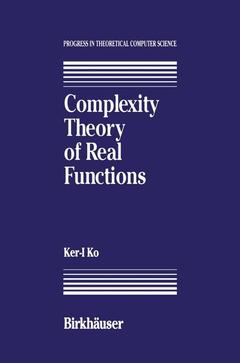Complexity Theory of Real Functions, Softcover reprint of the original 1st ed. 1991 Progress in Theoretical Computer Science Series
Langue : Anglais
Auteur : Ko K.

Starting with Cook's pioneering work on NP-completeness in 1970, polynomial complexity theory, the study of polynomial-time com putability, has quickly emerged as the new foundation of algorithms. On the one hand, it bridges the gap between the abstract approach of recursive function theory and the concrete approach of analysis of algorithms. It extends the notions and tools of the theory of computability to provide a solid theoretical foundation for the study of computational complexity of practical problems. In addition, the theoretical studies of the notion of polynomial-time tractability some times also yield interesting new practical algorithms. A typical exam ple is the application of the ellipsoid algorithm to combinatorial op timization problems (see, for example, Lovasz [1986]). On the other hand, it has a strong influence on many different branches of mathe matics, including combinatorial optimization, graph theory, number theory and cryptography. As a consequence, many researchers have begun to re-examine various branches of classical mathematics from the complexity point of view. For a given nonconstructive existence theorem in classical mathematics, one would like to find a construc tive proof which admits a polynomial-time algorithm for the solution. One of the examples is the recent work on algorithmic theory of per mutation groups. In the area of numerical computation, there are also two tradi tionally independent approaches: recursive analysis and numerical analysis.
Mathematics background.- Notation.- 1 Basics in Discrete Complexity Theory.- 1.1 Models of computation and complexity classes.- 1.2 NP-completeness.- 1.3 Polynomial-time hierarchy.- 1.4 Relativization.- 1.5 Probabilistic complexity classes.- 1.6 Complexity of counting.- 1.7 One-way functions.- 1.8 Polynomial-size circuits and sparse sets.- 2 Computational Complexity of Real Functions.- 2.1 Computable real numbers.- 2.2 Complexity of computable real numbers.- 2.3 Computable real functions.- 2.4 Complexity of computable real functions.- 2.5 Computable multi-dimensional functions.- 2.6 Partial computable real functions and recursively open sets.- 2.7 Computable numerical operators.- 3 Maximization.- 3.1 Computability of the maximum points.- 3.2 Maximization and nondeterminism.- 3.3 Maximum values and NP real numbers.- 3.4 Complexity of NP real numbers.- 3.5 Maximization and NP real functions.- 3.6 Hierarchy of min-max operations.- 3.7 Complexity of NP real functions.- 3.8 Open questions.- 4 Roots and Inverse Functions.- 4.1 Computability of roots.- 4.2 Complexity of roots and inverse modulus of continuity.- 4.3 Complexity of roots and differentiability.- 4.4 Log-space computable real functions.- 4.5 Log-space computability of roots of one-to-one functions.- 4.5.1 A discrete version.- 4.5.2 Log-space computability of roots.- 4.5.3 Differentiability does not help131 One-way functions and roots of two-dimensional one-to-one functions.- 4.6.1 A sufficient condition.- 4.6.2 Strong one-way functions.- 4.6.3 Necessary conditions137 Roots of one-dimensional k-to-one functions.- 4.7.1 Inverse modulus of continuity.- 4.7.2 Roots of three-to-one functions.- 4.7.3 Roots of four-to-one functions.- 4.8 Open questions.- 5 Measure and Integration.- 5.1 Recursive measure theory.- 5.1.1 Recursively approximable sets.- 5.1.2 Recursively approximable functions.- 5.1.3 Recursive approximability versus computability.- 5.2 Polynomial-time approximation.- 5.3 Polynomial-time approximation and probabilistic computation.- 5.4 Complexity of integration.- 5.5 Open questions.- 6 Differentiation.- 6.1 Computability of derivatives.- 6.2 Derivatives of analytic functions.- 6.3 Functions of bounded variations.- 7 Ordinary Differential Equations.- 7.1 ODEs without the Lipschitz condition.- 7.2 ODEs with the Lipschitz condition: upper bound.- 7.2.1 Polynomial-space computable real numbers and real functions.- 7.2.2 Proof for upper bound.- 7.3 ODEs with the Lipschitz condition: lower bound.- 7.3.1 A discrete initial value problem.- 7.3.2 The basic construction.- 7.3.3 Proofs for lower bounds.- 7.4 Open questions.- 8 Approximation by Polynomials.- 8.1 Polynomial Version of the Weierstrass approximation theorem.- 8.2 Best Chebyshev approximation: complexity of the errors.- 8.3 Best Chebyshev approximation: complexity of the approximation functions.- 9 An Optimization Problem in Control Theory.- 9.1 A discrete version.- 9.2 The basic construction.- 9.3 The complexity of LCTEAM.
Date de parution : 03-2012
Ouvrage de 310 p.
15.5x23.5 cm
Disponible chez l'éditeur (délai d'approvisionnement : 15 jours).
Prix indicatif 84,35 €
Ajouter au panierThèmes de Complexity Theory of Real Functions :
© 2024 LAVOISIER S.A.S.



